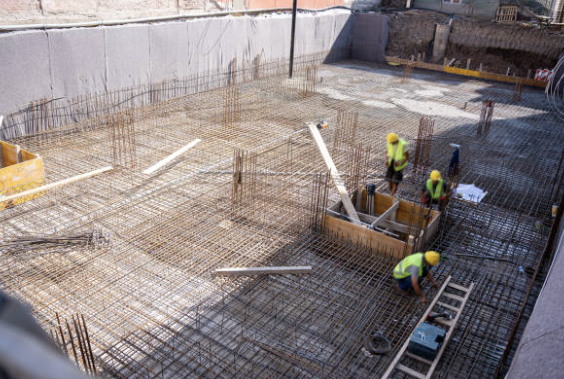
Posted on Wednesday, April 24, 2024
The U.S. steel industry is a cornerstone of the country's industrial and economic landscape, providing numerous job opportunities across various roles. From manufacturing and quality control to engineering and logistics, the industry thrives on skilled professionals dedicated to advancing steel production, fabrication, and application.
What They Do:
Steel fabricators shape raw steel into structures, components, and products used in construction, machinery, and more. They use tools like welding equipment, presses, and CNC machines.
Why It’s Popular:
The growing demand for steel in construction and infrastructure projects ensures a steady demand for skilled fabricators.
What They Do:
Metallurgists study the physical and chemical properties of metals. In the steel industry, they focus on improving steel's strength, durability, and performance characteristics.
Why It’s Popular:
Innovation in alloys and sustainable steel production relies heavily on metallurgists' expertise.
What They Do:
Welders join pieces of steel using high-heat tools, creating strong bonds for industrial and commercial use.
Why It’s Popular:
Welders are crucial in steel construction, from building skyscrapers to fabricating machinery.
What They Do:
CNC (Computer Numerical Control) operators program and operate machines that cut, bend, and shape steel into precise forms.
Why It’s Popular:
The rise of automation and advanced manufacturing has increased the demand for skilled CNC operators in the steel industry.
What They Do:
Quality control inspectors ensure that steel products meet industry standards and customer specifications. They perform tests, measurements, and inspections throughout the production process.
Why It’s Popular:
Consistency and compliance are critical in the steel industry, making this role indispensable.
What They Do:
Mill operators oversee the equipment that produces raw steel. They manage processes like smelting, casting, and rolling steel into usable forms.
Why It’s Popular:
As the backbone of steel production, mill operators play a vital role in maintaining high production levels.
What They Do:
Structural engineers design frameworks and structures using steel. They ensure that buildings, bridges, and other projects can safely withstand stress and environmental forces.
Why It’s Popular:
Steel's importance in construction makes structural engineering a high-demand job.
What They Do:
Logistics coordinators manage the supply chain for steel products, ensuring efficient transport from mills to distributors and customers.
Why It’s Popular:
Timely delivery of steel is essential for construction and manufacturing, keeping logistics coordinators in demand.
What They Do:
EHS specialists focus on maintaining workplace safety and ensuring compliance with environmental regulations in steel production.
Why It’s Popular:
Sustainability and worker safety are priorities in modern steel production, making this role essential.
What They Do:
Maintenance technicians repair and maintain the machinery used in steel production. They troubleshoot issues to minimize downtime and optimize efficiency.
Why It’s Popular:
The reliance on advanced equipment in steel manufacturing keeps maintenance technicians in high demand.
The steel industry involves the production, processing, and distribution of steel for use in construction, manufacturing, transportation, and other sectors. It is integral to building infrastructure and driving industrial growth.
Q: What qualifications are needed to work in the steel industry?
A: Qualifications vary by role. For example, welders often require certification, while metallurgists typically hold degrees in material science or engineering.
Q: How is technology changing steel industry jobs?
A: Automation, robotics, and AI are creating new roles focused on advanced manufacturing and reducing the need for manual tasks.
Q: What is the average salary in the steel industry?
A: Salaries range from $40,000 for entry-level positions like machine operators to over $100,000 for specialized roles like metallurgists and structural engineers.
Q: Is the steel industry growing in the U.S.?
A: Yes, driven by infrastructure projects and innovations in green steel production.
The U.S. steel industry offers diverse career opportunities that are both challenging and rewarding. Whether you’re interested in hands-on roles like welding or analytical positions like metallurgist, this industry is full of possibilities. As technology advances, the demand for skilled professionals will continue to rise, shaping a future where steel remains essential to progress.

Used Purlin Roll Forming Machines for Sale Worldwide
Posted on Sunday, January 25, 2026
Pre-Owned Roll Forming Machines for Purlin & Structural Steel Profiles

Used Roof Panel Roll Forming Machines for Sale Worldwide
Posted on Sunday, January 25, 2026
Pre-Owned Roll Forming Machines for Roofing Panel Production

Used Roll Forming Machines for Sale Worldwide
Posted on Tuesday, January 20, 2026
Pre-Owned Roll Forming Machines with Inspection, Verification & Global Support

Steel Coil Supply for Roll Forming Machines Worldwide
Posted on Tuesday, January 20, 2026
Reliable Steel Coil Supply for Roll Forming, Fabrication & Manufacturing Applications
Copyright 2026 © Machine Matcher.